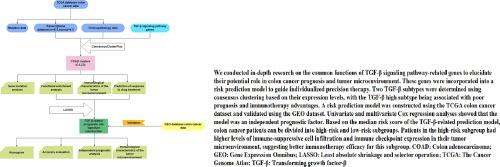Transforming growth factor-β (TGF-β) signaling pathway-related genes in predicting the prognosis of colon cancer and guiding immunotherapy
IF 2.8
引用次数: 0
Abstract
Background
Colon cancer is a malignant tumor with high malignancy and a low survival rate whose heterogeneity limits systemic immunotherapy. Transforming growth factor-β (TGF-β) signaling pathway-related genes are associated with multiple tumors, but their role in prognosis prediction and tumor microenvironment (TME) regulation in colon cancer is poorly understood. Using bioinformatics, this study aimed to construct a risk prediction signature for colon cancer, which may provide a means for developing new effective treatment strategies.
Methods
Using consensus clustering, patients in The Cancer Genome Atlas (TCGA) with colon adenocarcinoma were classified into several subtypes based on the expression of TGF-β signaling pathway-related genes, and differences in survival, molecular, and immunological TME characteristics and drug sensitivity were examined in each subtype. Ten genes that make up a TGF-β-related predictive signature were found by least absolute shrinkage and selector operation (LASSO) regression using colon cancer data from the TCGA database and confirmed using a Gene Expression Omnibus (GEO) dataset. A nomogram incorporating risk scores and clinicopathologic factors was developed to stratify the prognosis of patients with colon cancer for accurate clinical diagnosis and therapy.
Results
Two TGF-β subtypes were identified, with the TGF-β-high subtype being associated with a poorer prognosis and superior sensitivity to immunotherapy. Mutation analyses showed a high incidence of gene mutations in the TGF-β-high subtype. After completing signature construction, patients with colon cancer were categorized into high- and low-risk subgroups based on the median risk score of the TGF-β-related predictive signature. The risk score exhibited superior predictive performance relative to age, gender, and stage, as evidenced by its AUC of 0.686. Patients in the high-risk subgroup had higher levels of immunosuppressive cell infiltration and immune checkpoints in the TME, suggesting that these patients had better responses to immunotherapy.
Conclusions
Patients with colon cancer were divided into two subtypes with different survival and immune characteristics using consensus clustering analysis based on TGF-β signaling pathway-related genes. The constructed risk prediction signature may show promise as a biomarker for evaluating the prognosis of colon cancer, with potential utility for screening individuals for immunotherapy.

预测结肠癌预后和指导免疫疗法的 TGF-β 信号通路相关基因
背景结肠癌是一种恶性程度高、生存率低的恶性肿瘤,其异质性限制了全身免疫疗法。转化生长因子-β(TGF-β)信号通路相关基因与多种肿瘤相关,但它们在结肠癌预后预测和肿瘤微环境(TME)调控中的作用却鲜为人知。本研究旨在利用生物信息学构建结肠癌的风险预测特征,从而为开发新的有效治疗策略提供手段。方法利用共识聚类,根据 TGF-β 信号通路相关基因的表达将癌症基因组图谱(The Cancer Genome Atlas,TCGA)中的结肠腺癌患者分为几个亚型,并研究每个亚型在生存、分子和免疫学 TME 特征及药物敏感性方面的差异。利用 TCGA 数据库中的结肠癌数据,通过最小绝对收缩和选择器操作(LASSO)回归,发现了构成 TGF-β 相关预测特征的 10 个基因,并利用基因表达总集(GEO)数据集进行了确认。结果发现了两种 TGF-β 亚型,其中 TGF-β 高亚型与较差的预后和对免疫疗法的高敏感性相关。突变分析表明,TGF-β-高亚型的基因突变发生率较高。特征构建完成后,根据TGF-β相关预测特征的中位风险评分将结肠癌患者分为高风险亚组和低风险亚组。相对于年龄、性别和分期,风险评分显示出更优越的预测性能,其AUC为0.686。结论通过基于 TGF-β 信号通路相关基因的共识聚类分析,结肠癌患者被分为两种具有不同生存和免疫特征的亚型。所构建的风险预测特征可能有望成为评估结肠癌预后的生物标记物,并有可能用于筛选接受免疫疗法的个体。
本文章由计算机程序翻译,如有差异,请以英文原文为准。
求助全文
约1分钟内获得全文
求助全文
来源期刊

Cancer pathogenesis and therapy
Surgery, Radiology and Imaging, Cancer Research, Oncology
CiteScore
0.80
自引率
0.00%
发文量
0
审稿时长
54 days
 求助内容:
求助内容: 应助结果提醒方式:
应助结果提醒方式:


